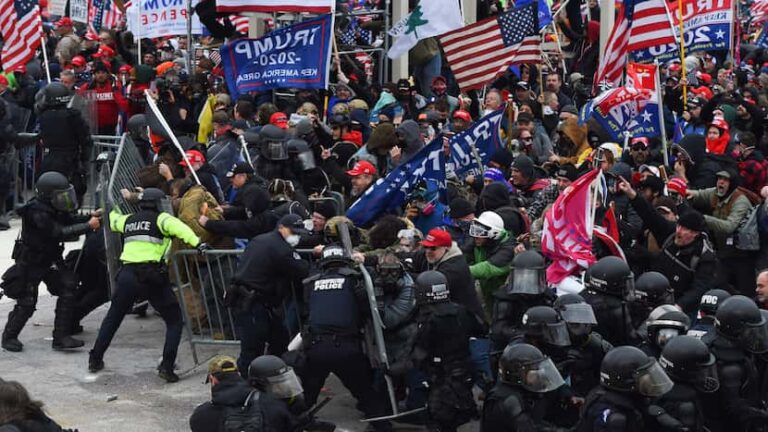Monday’s stunning Supreme Court decision on presidential immunity overshadowed another decision with significant implications for the rule of law. A week ago, the Supreme Court denied that the January 6 rioters could be charged with obstruction of justice. The decision could lead to the dismissal of more than 100 lawsuits filed by people who disrupted the certification of the 2020 presidential election. The decision is particularly ominous because it came just hours after a debate in which former President Donald Trump refused three times to say he would accept the results of this year’s election.
In recent years, the United States has seen a surge in political violence. Threats against members of Congress increased tenfold between 2016 and 2021. Serious threats against federal judges have more than doubled since 2021, according to the U.S. Marshals Service. About one-fifth of local elected officials receive threats every three months, and it’s even worse in large cities. In San Diego, 75% of local government employees reported being threatened or harassed, and more than half of them have considered leaving office because of it, according to a University of San Diego study. Hate crimes have soared to the highest point this century, according to the Department of Justice.
This rising tide makes deterrence especially important. And the good news is that it works: Israeli and German studies have shown that violent extremists are less likely to act when they see governments and law enforcement as being against them. They are emboldened when they believe they can get away with just a wink or a nod.
We also know that deterrence works for reasons closer to home. The Institute for Strategic Dialogue, an organization that monitors violent extremism online, reports that violent conversations among right-wing extremists have quieted since the prosecutions began on January 6. Mentions of violence attract posts suggesting that FBI agents may be among them, or that they may be trying to lure them into false flag operations. Sure, the conversations continue in private chats that can’t be monitored. And the guilty verdicts in the Trump hush money case sparked outrage. But the kind of open planning of violence that could draw more people to the movement has dropped significantly, thanks to the sense that violence is punishable.
Unfortunately, the need for deterrence remains. While the majority of Americans reject all forms of political violence, some do not. Of particular concern are certain groups. For example, most gun owners are less justifying political violence than the general population. But those who bought guns during or since 2020 are more likely to do so, especially if they carry their guns all or almost all the time. A survey conducted by the Violence Prevention Research Program at the University of California, Davis, found that regular gun owners who bought guns after 2020 were the people most likely to think a civil war would break out.
Any political violence is bad for a democracy. It is especially serious when it ends more than 200 years of peaceful transfer of power between political parties and allows the other party to take power. A common-sense interpretation of the law the Supreme Court has been asked to consider would help prevent a repeat of the events of January 6th. The law applies to anyone who “obstructs, influences, or obstructs, or attempts to obstruct, influence, or obstruct any public proceeding.”
In the face of the refusal to hold the insurrectionists to account, Americans are doing all they can to strengthen stability, peace, and democracy. A survey by the National Democracy Center found that an overwhelming majority of Americans on both sides of the political aisle reject political violence. Businessmen in Arizona and Wisconsin have spoken out in support of our electoral system. More than 120,000 veterans have become poll workers, continuing their service to the country and reassuring themselves and others that our elections are fair. Law enforcement is currently training to ensure that the fall elections are held safely. Many politicians, like Utah Governor Spencer Cox, are also committed to keeping the peace. Governor Cox has led the National Governors Association in its “Better Disagreement” campaign all year.
The fact is, few are violent, and few want violence. Instead, Americans want more peace, hope, and community. And many are banding together to add just that to our civic life, from Kiwanis Club pancake breakfasts across the country on the Fourth of July to the “Joy to the Polls” effort that brought DJs and dancing to Election Day 2020. And that effort is set to continue this fall.
This enormous energy of Americans who love their country, who care for their neighbors, and who want to see our country back better deserves to be echoed by our senior political and judicial leaders. In other countries, courts have been essential to re-establishing the guardrails of democracy. If the Supreme Court will not do that, then we must do even more by coming together with our neighbors, our friends, our family, those with whom we differ but who can at least agree on peace.
Rachel Kleinfeld is a senior fellow at the Carnegie Endowment for International Peace. Her last book was Savage Commandlooked at the world’s most violent democracies and how they recovered.
We welcome your comments via letters to the editor. Please see our guidelines. Send your letter hereIf you have any problems with the form, please email us. Email:

